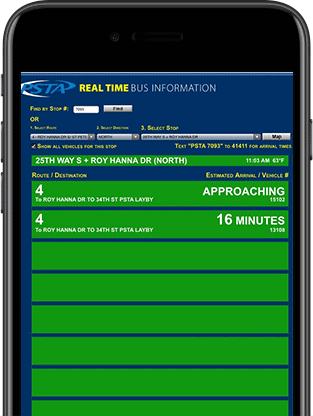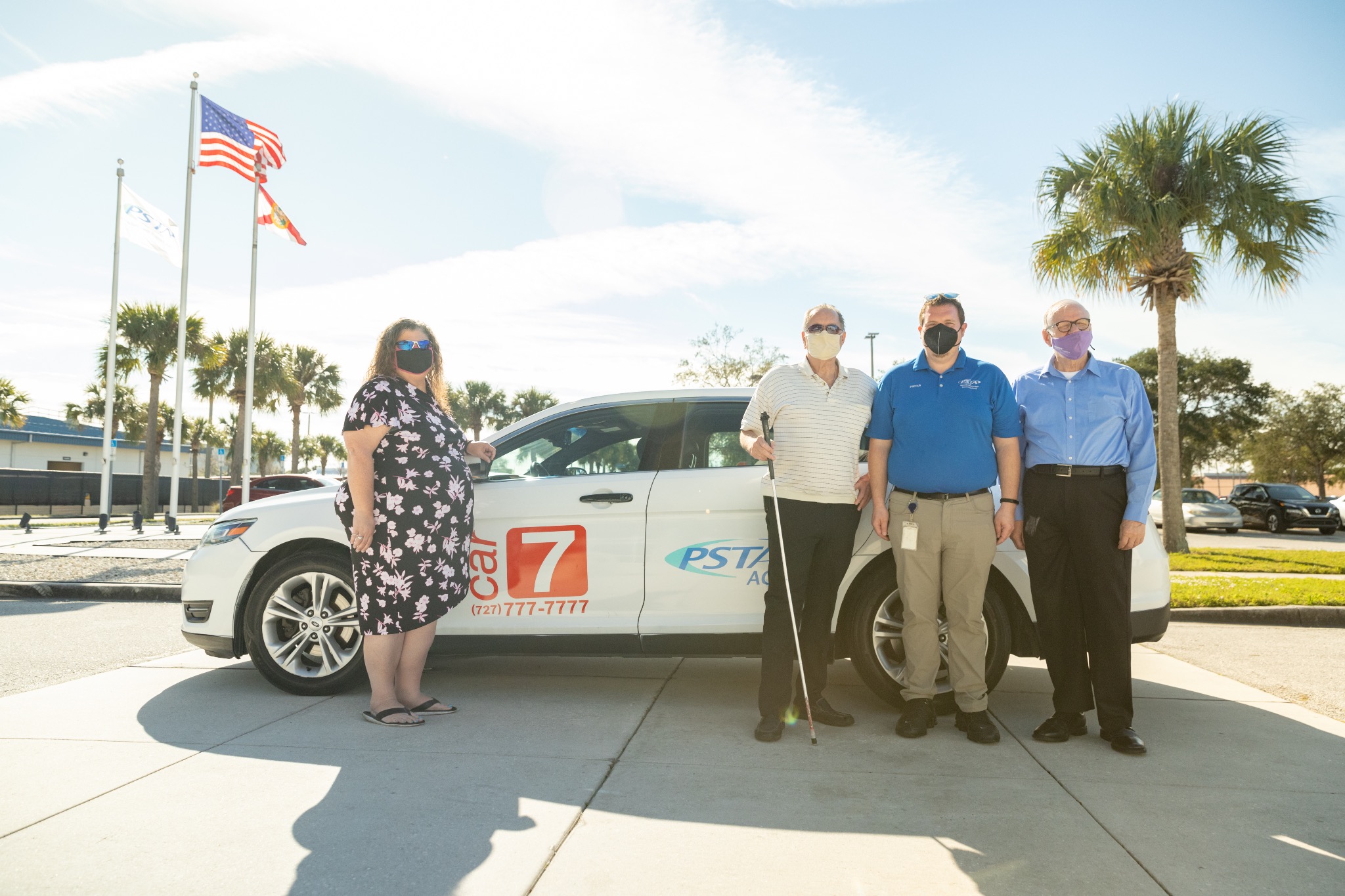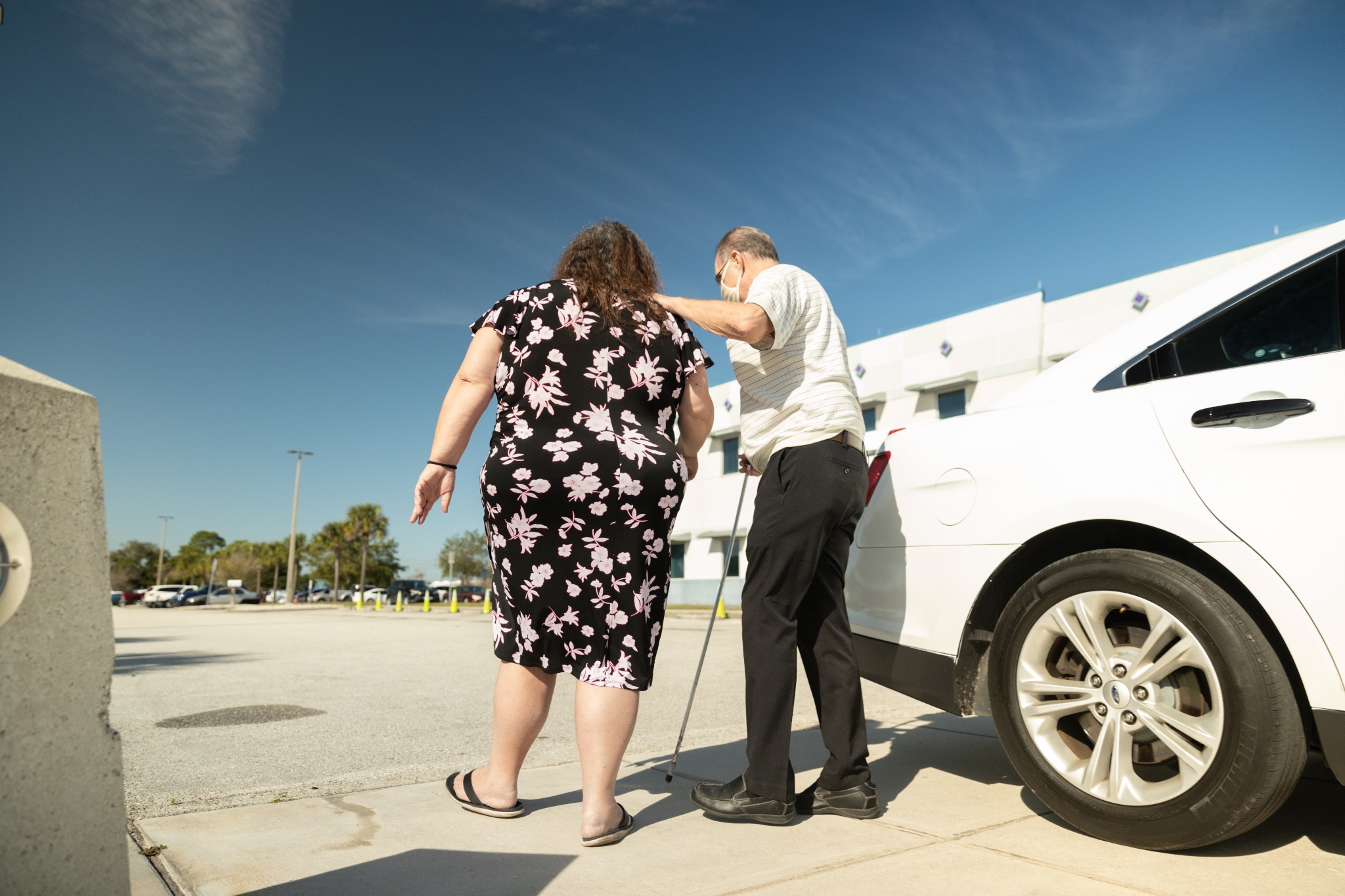Let’s talk about the many options PSTA’s paratransit service offers for customers with disabilities!
For this month’s Deep Drive, we’ll take a look at Access—PSTA’s paratransit service—and all the ways it helps people with disabilities.
What is Paratransit?
Since the Americans with Disabilities Act (ADA) of 1990 passed, public transit agencies are required to provide paratransit service for people who cannot ride the bus or trolley due to disability.
PSTA Access Paratransit Services
PSTA’s paratransit drivers will go to a customer’s door and assist them in getting to the vehicle. Our services can include pushing a wheelchair or offering assistance while walking, drivers are trained in ways to help our paratransit customers with respect and dignity.
What is PSTA Access?
Access is PSTA’s paratransit service (previously called DART). This service is typically provided with a bus specially designed to help customers of all disability levels get onboard and ride comfortably. All Access drivers receive special training to help customers get to and from the bus to their destination. Access can serve as a fantastic backup service if family or friends are unavailable to provide transportation or alternative services are unaffordable or cannot accommodate a wheelchair.
Access customers also have the option of getting rides through PSTA’s Mobility-on-Demand program. While Access requires customers to reserve their ride the day before they need it, sometimes life happens and rides are needed on a shorter timeline. This is where Mobility-on-Demand comes in.
Customers can call PSTA and request a ride on demand, which contracts with providers like Uber, Lyft, taxis, or Wheelchair Transport Service. Because Mobility-on-Demand rides are curb-to-curb and providers are not trained like Access drivers are, they can’t help customers to their doors.
Whether by scheduling through the Access app or calling in for their ride through the Mobility-on-Demand program, PSTA can help schedule the best option for customers no matter their disability.
PSTA Access Vehicle
How PSTA Access and Mobility-on-Demand Works
Customers unable to use PSTA buses and trolleys must apply to see if they are eligible for paratransit. This process is designed to be simple, requiring no compiling of documents or tedious paperwork. Just call (727) 540-1888 for an application, which is sent via email, mail, or fax. Next, a 30-minute mobility phone consultation will be conducted.
After the mobility consultation and medical verification are complete, an eligibility determination letter will be mailed within 21 days. Once a customer’s eligibility has been determined, they will be able to reserve an Access ride or call for a ride through Mobility-on-Demand.
Fares
For Access, fares are paid by cash or through pre-paid tickets, while Mobility-on-Demand can be paid for with credit and debit cards. Current fares are $4.50/trip for Access and $3.50/trip for MOD. There are even more differences between the two services as well.
Timing
Access rides must be reserved 24-hours in advance, which is ideal for medical appointments, planned meetups, and other scheduled events. Scheduling can easily be done by reserving the ride via phone or through the app.
But what about those trips that aren’t planned or anticipated? That’s where Mobility-on-Demand shines—customers can call for aride when they’re ready, making quick trips to the store or impromptu plans with friends much easier.
Experience
For many people with disabilities, the biggest barrier to transportation isn’t always ramps or curbs—it’s stigma. Some report that judgment they receive from others is a big deterrent to transportation. That’s why Access drivers receive specialized training to not only ensure they can keep customers safe, but treat them with dignity and respect.
While Mobility-on-Demand may be the quicker, more convenient option, because these rides are contracted through services like Uber and Lyft, customers adept at advocating for themselves may enjoy Mobility-on-Demand more. Should a customer ever have an issue with a Mobility-on-Demand driver, PSTA is always just a phone call away to help.
How Accessible are PSTA City Buses and Trolleys?
In addition to paratransit, the ADA requires transit agencies to provide non-paratransit buses to be fully accessible—and some customers may be unaware of just how accessible PSTA city buses and trolleys are!
For example, some customers with disabilities worry they can’t step up onto the bus. To address this concern, every single PSTA bus can be lowered to minimize this step and is equipped with ramps, which all customers are entitled to use upon request. Customers just need to request a ramp from the driver and, with the simple push of a button, it can be lowered.
PSTA Travel Training
Travel Training
Travel training is a great service for people of all ages and disabilities to learn to use the accessibility options onboard PSTA buses. Here’s how it works:
PSTA’s expert travel trainers will come to a customer’s home and provide one-on-one, ride-along training on how to ride the bus and use related resources. They can also help customers find the best way to get to their ride, including finding the best routes to use and locating a stop with a shelter and bench.
The travel trainer’s goal is to take the guesswork out of the process so customers can ride with confidence. The program is free and tailored to each customer’s unique needs, whether they have mobility limitations, hearing loss, visual impairment, or an intellectual disability.
During the travel training, customers learn how to:
- Plan a trip using printed and digital scheduling tools tailored to each customer’s needs
- Pay bus fare, including the use of the Flamingo Fares app, digital wallets, and credit or debit cards
- Find the way to and from bus stops on safe and accessible routes
- Recognize stops, route numbers, and names
- Use the Real Time Bus Information website to track buses
- Get on and off the bus and transfer buses, including using mobility devices
For more about PSTA's travel training program, click here.
For more information, visit the PSTA Access webpage or call (727) 540-1888.





